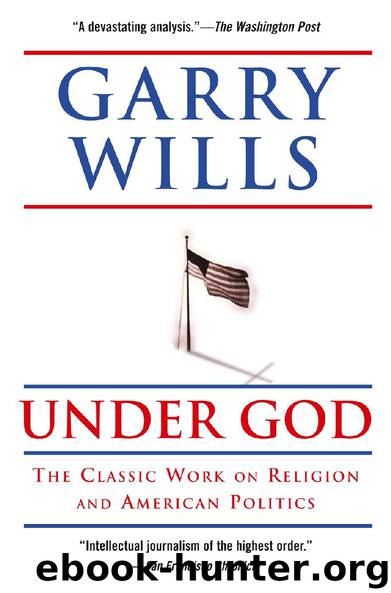Under God by Garry Wills

Author:Garry Wills
Language: eng
Format: epub
Publisher: Simon & Schuster
TWENTY-TWO
Preacher Andy
THOUGH MAYOR YOUNG OF ATLANTA is a Jackson, he was not named—like Jesse Jackson—for a black preacher. He got his name, like his father before him and his son after, from a white political leader: He is Andrew Jackson Young, reflecting his place of birth (New Orleans) and his father’s aspiration for acceptance. Young was criticized for his emphasis on white acceptance in his days with Dr. King. He even had to punch it out with Hosea Williams after Williams claimed, once too often, that he was a CIA plant. 1
But Young is a black preacher, by an act more deliberately willed than Dr. King’s choice of vocation ever was. King succeeded to his father’s Atlanta congregation, in a place where middle-class black preachers were the natural leaders of society. Young grew up in a prosperous dentist’s home, where the “advance” into secularity that Adolph Reed recommends had already been accomplished. Though Louis Armstrong was his father’s dental patient, and Young himself took trumpet lessons in his youth, he did not grow up in the New Orleans of jazz and “gospel” and the blues. “We were not allowed to go to places where that was played,” he told me. “We went to the symphony. My parents wanted to escape black culture. That was when you talked about how Indian you were.” (Like Jesse Jackson and Julian Bond, Young has Native American ancestors.) Young says his family “lived in a transplanted New England culture. My father played The Messiah at home. The closest we came to gospel music was the Fisk Jubilee Choir.” He was taken to hear black artists if they were classical singers—Roland Hayes, Marian Anderson, Todd Duncan, Paul Robeson—“and I had no idea of Robeson’s politics the two or three times I heard him sing.”
Even if Young had grown up in the broader culture of New Orleans, that was not the “real” South he would contend with in the 1960s. “We always thought of New Orleans as civilized,” he says now. Southerners who think Atlanta is no better than a Northern town think New Orleans is no better than a European town. And even there the Youngs were set apart. Though Young was born in the Depression, in the very year Roosevelt was elected, both his parents were college graduates (from Congregationalist Dillard University). His father had white patients as well as black. Most of Young’s childhood friends were white, but “poor white”—when they played it was with his ball. I asked if these friendships endured. “No, they ended at puberty.” Does that mean he had played with white girls before that? “Oh no. We pretended white girls didn’t exist, even when we were good friends of their brothers.”
Young first entered a fully segregated world in public grade school, where he was the victim of black prejudice: “It was a class resentment at me, for being middle-class.” That was not the only problem Young had to contend with. His parents could afford, in the Depression, to send their precocious child to a nursery school; by the time he went there he was already reading.
Download
This site does not store any files on its server. We only index and link to content provided by other sites. Please contact the content providers to delete copyright contents if any and email us, we'll remove relevant links or contents immediately.
| Elections & Political Process | Ideologies & Doctrines |
| International & World Politics | Political Science |
| Public Affairs & Policy | Specific Topics |
| United States |
The Secret History by Donna Tartt(19086)
The Social Justice Warrior Handbook by Lisa De Pasquale(12190)
Thirteen Reasons Why by Jay Asher(8909)
This Is How You Lose Her by Junot Diaz(6886)
Weapons of Math Destruction by Cathy O'Neil(6279)
Zero to One by Peter Thiel(5801)
Beartown by Fredrik Backman(5754)
The Myth of the Strong Leader by Archie Brown(5507)
The Fire Next Time by James Baldwin(5442)
How Democracies Die by Steven Levitsky & Daniel Ziblatt(5218)
Promise Me, Dad by Joe Biden(5153)
Stone's Rules by Roger Stone(5087)
A Higher Loyalty: Truth, Lies, and Leadership by James Comey(4961)
100 Deadly Skills by Clint Emerson(4925)
Rise and Kill First by Ronen Bergman(4788)
Secrecy World by Jake Bernstein(4753)
The David Icke Guide to the Global Conspiracy (and how to end it) by David Icke(4717)
The Farm by Tom Rob Smith(4507)
The Doomsday Machine by Daniel Ellsberg(4490)
